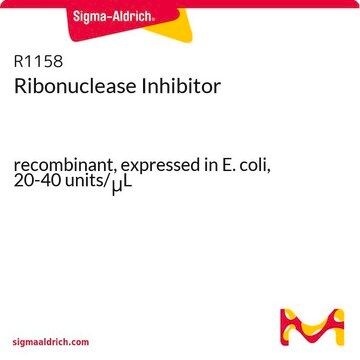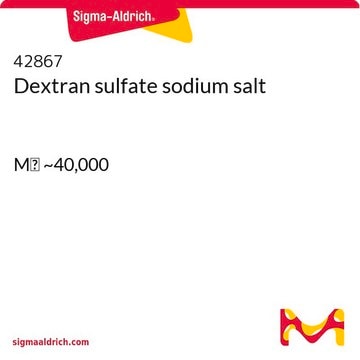556881
Ribonuclease Inhibitor, Human, Recombinant, E. coli
The Ribonuclease Inhibitor, Human, Recombinant, E. coli controls the biological activity of Ribonuclease. This small molecule/inhibitor is primarily used for Protease Inhibitors applications.
Se connecterpour consulter vos tarifs contractuels et ceux de votre entreprise/organisme
About This Item
Code UNSPSC :
12352200
Produits recommandés
Niveau de qualité
Forme
liquid
Activité spécifique
≥20,000 units/mL
Fabricant/nom de marque
Calbiochem®
Conditions de stockage
OK to freeze
Activité étrangère
Endonuclease and RNase, none detected
Conditions d'expédition
wet ice
Température de stockage
−20°C
Description générale
Recombinant, human ribonuclease inhibitor expressed in E. coli. Non-competitive inhibitor that inactivates RNase by non-covalent binding. Has been used to improve cDNA synthesis and in vitro RNA synthesis, increase yields of polysomes and aid in the preparation of RNase-free antibodies. Inhibits RNases A, B, and C. Does not inhibit RNase T1 and S1 nuclease from Aspergillus.
Recombinant, human ribonuclease inhibitor expressed in E. coli. Non-competitive inhibitor that inactivates RNase by non-covalent binding. Has been used to improve cDNA synthesis and in vitro RNA synthesis, increase yields of polysomes, and aid in the preparation of RNase-free antibodies. Inhibits RNases A, B, and C. Does not inhibit RNase T1 and S1 nuclease from Aspergillus.
Actions biochimiques/physiologiques
Cell permeable: no
Primary Target
inactivates RNase
inactivates RNase
Product does not compete with ATP.
Reversible: no
Avertissement
Toxicity: Standard Handling (A)
Définition de l'unité
One unit is defined as the amount of material that will inhibit 50% of the activity of 5 ng of RNase A.
Forme physique
In 50 mM KCl, 20 mM HEPES, 8 mM DTT, 50% glycerol.
Reconstitution
Maintain at -20°C. Avoid freezing solutions. Addition of DTT is recommended to maintain 8 mM level.
Autres remarques
Saxena, S.K., et al. 1992. J. Biol. Chem. 267, 21982.
Lee, F.S., et al. 1989. Biochemistry 28, 225.
Lee, F.S., et al. 1989. Biochemistry 28, 225.
Informations légales
CALBIOCHEM is a registered trademark of Merck KGaA, Darmstadt, Germany
Code de la classe de stockage
12 - Non Combustible Liquids
Classe de danger pour l'eau (WGK)
WGK 1
Point d'éclair (°F)
Not applicable
Point d'éclair (°C)
Not applicable
Certificats d'analyse (COA)
Recherchez un Certificats d'analyse (COA) en saisissant le numéro de lot du produit. Les numéros de lot figurent sur l'étiquette du produit après les mots "Lot" ou "Batch".
Déjà en possession de ce produit ?
Retrouvez la documentation relative aux produits que vous avez récemment achetés dans la Bibliothèque de documents.
Vera Thole et al.
BMC genomics, 20(1), 995-995 (2019-12-21)
Flavonoids are produced in all flowering plants in a wide range of tissues including in berry fruits. These compounds are of considerable interest for their biological activities, health benefits and potential pharmacological applications. However, transcriptomic and genomic resources for wild
Nida Ali et al.
Nucleic acids research, 48(2), 847-861 (2019-12-06)
RNase E is a 472-kDa homo-tetrameric essential endoribonuclease involved in RNA processing and turnover in Escherichia coli. In its N-terminal half (NTH) is the catalytic active site, as also a substrate 5'-sensor pocket that renders enzyme activity maximal on 5'-monophosphorylated
Asimina Katsiani et al.
The Journal of general virology, 101(6), 676-684 (2020-05-08)
Rose rosette virus (RRV) (genus Emaravirus) is the causal agent of the homonymous disease, the most destructive malady of roses in the USA. Although the importance of the disease is recognized, little sequence information and no full genomes are available
Susara Madduma Hewage et al.
Frontiers in medicine, 7, 80-80 (2020-04-16)
Chronic low-grade inflammation is a major stimulus for progression of chronic kidney disease (CKD) in individuals consuming high-fat diet. Currently, there are limited treatment options for CKD other than controlling the progression rate and its associated complications. Lingonberry (Vaccinium vitis-idaea
Ihshan Akthar et al.
Reproduction (Cambridge, England) (2019-12-04)
We previously reported that sperm binding to cultured monolayers of bovine uterine epithelial cells induces an acute inflammatory response involving the Toll-like receptor (TLR2) signaling pathway. This response serves to clear the uterus of sperm and thereby prepares the endometrium
Notre équipe de scientifiques dispose d'une expérience dans tous les secteurs de la recherche, notamment en sciences de la vie, science des matériaux, synthèse chimique, chromatographie, analyse et dans de nombreux autres domaines..
Contacter notre Service technique







